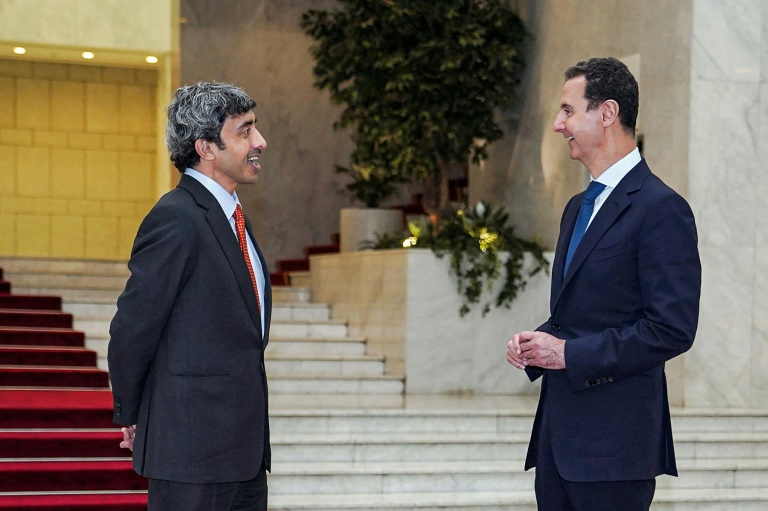The United Arab Emirates’ top diplomat met Syria’s President Bashar al-Assad in Damascus Tuesday for the first time since Syria’s war began, triggering US denunciations of efforts to normalise ties with a “dictator.”
The visit is widely seen as a sign of regional efforts to end Assad’s diplomatic isolation as Syria grapples with a spiralling economic crisis caused by years of conflict and compounded by Western sanctions.
“President Assad received UAE Foreign Minister Abdullah bin Zayed Al-Nahyan” and an accompanying delegation, Syrian state news agency SANA said.
“They discussed bilateral relations between the two brotherly countries and ways to develop cooperation in different sectors that are of common interest,” it added.
The meeting is the latest sign of warming ties between Syria and the UAE after the oil-rich Gulf state broke ties with Damascus in February 2012.
According to UAE state media, the foreign minister “underlined the UAE’s keenness on ensuring the security, stability and unity of Syria”.
During the talks he also expressed “support for all efforts made to end the Syrian crisis, consolidate stability in the country and meet the aspirations of the Syrian people,” the official WAM news agency said.
But the UAE’s ally Washington quickly expressed concern over the signal sent by the encounter.
“This administration will not express any support for efforts to normalise or rehabilitate Bashar al-Assad, who is a brutal dictator,” State Department spokesman Ned Price told reporters, not referring to him as president.
The UAE severed relations as Syria’s repression of nationwide protests demanding regime change was escalating into a devastating war that has since left nearly half a million people dead.
Syria is backed by the Gulf state’s regional rival Iran, but in December 2018 the UAE reopened its embassy in Damascus, suggesting an effort to bring the Syrian government back into the Arab fold.
The move was followed by the UAE’s calling in March this year for Syria to return to the Arab League — having been a key backer of its suspension in November 2011.
– ‘Arab fold’ –
Egypt, home of the pan-Arab body, said Tuesday that relations should eventually be restored with Syria but that Damascus needed to first address concerns such as the humanitarian effects of the war.
Addressing the Woodrow Wilson International Center for Scholars in Washington, Egypt’s Foreign Minister Sameh Shoukry said that Syria needed to “show greater moderation in how it regains the trust of both the region and in its own internal dynamics”.
Damascus is struggling to secure international aid, namely from oil-rich Arab regional neighbours that supported the opposition in the early days of the war.
Last month, the UAE’s economy ministry said it agreed with Syria on “future plans to enhance economic cooperation and explore new sectors”.
A ministry statement said the UAE was Syria’s most prominent global trade partner, with a 14 percent share of Syria’s foreign trade.
Also last month, Abu Dhabi’s Crown Prince Sheikh Mohammed bin Zayed Al-Nahyan — the de facto ruler of the UAE — discussed developments in Syria with Assad in the second call between the two leaders since March last year.
– ‘Assad’s lifeline’ –
Analyst Nicholas Heras of Newlines Institute in Washington said that the “UAE is Assad’s lifeline” in light of crippling Western sanctions.
“Damascus needs the Emirati channel… to eventually access critical funding and business acumen for an Assad-led reconstruction process in Syria,” Heras said.
The UAE is not the only Arab country moving closer to Assad’s government.
In October, Assad called King Abdullah II of Jordan for the first time since the start of Syria’s conflict.
The two neighbours had reopened a major border crossing days earlier.
The UAE is one of the six Gulf Cooperation Council member states that took a tough stance against Damascus in 2012 and eventually recognised an opposition umbrella group as the representative of Syria.
Some regional powers see warming up to Damascus as a way of luring Syria away from the exclusive regional influence of Iran — a staunch supporter of Assad’s government that has expanded its military footprint in Syria throughout the course of the conflict.











